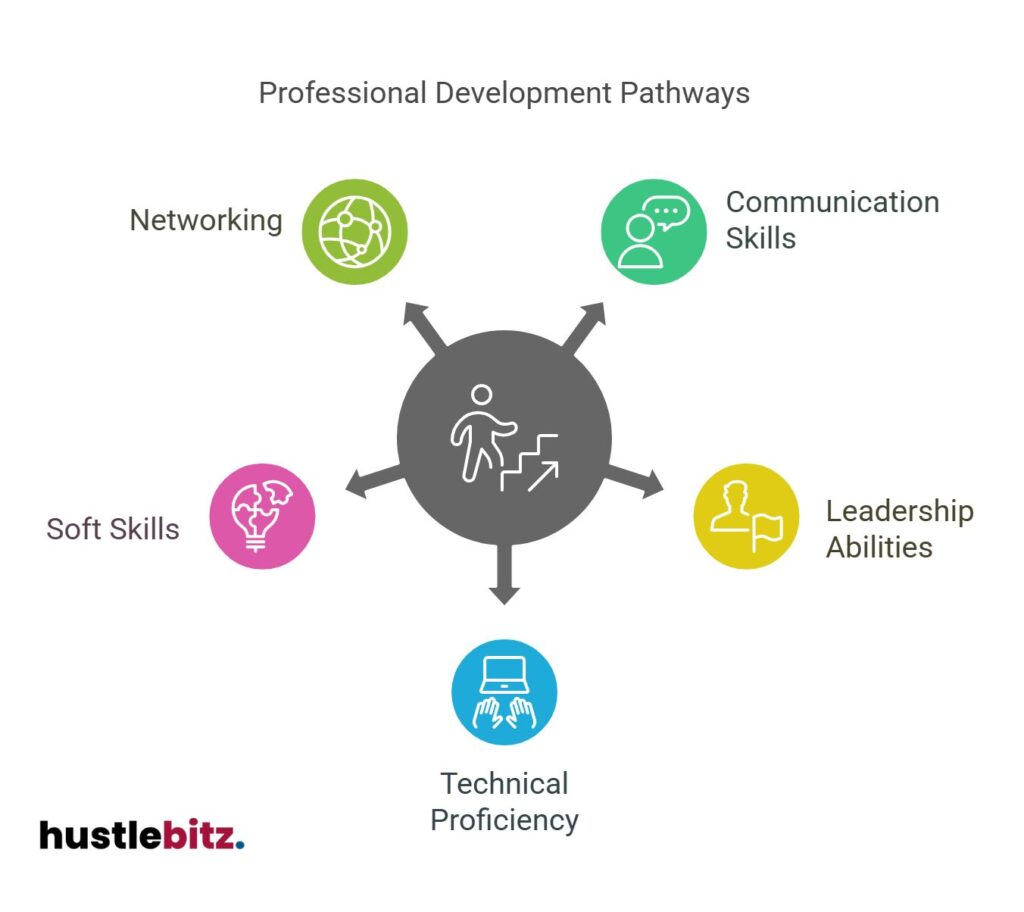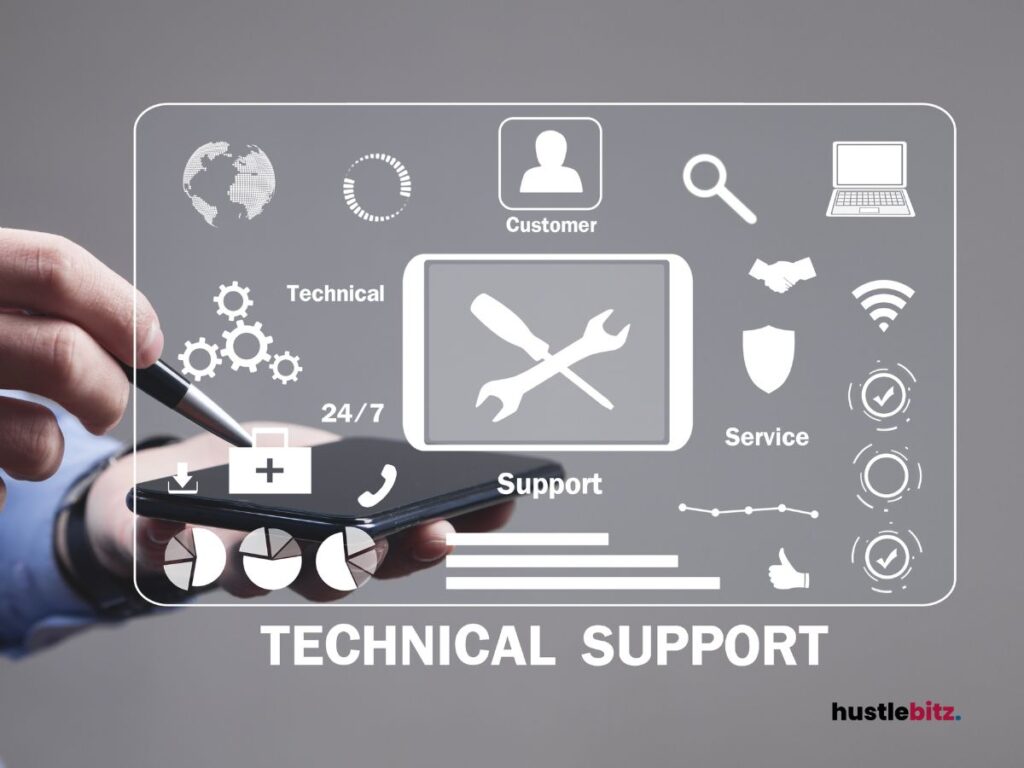Advancing your career necessitates mastering a set of essential skills that are crucial for professional growth. Effective communication is key to articulating ideas clearly and fostering collaboration within teams. Leadership and management capabilities are indispensable for inspiring teams and aligning them with organizational objectives. Staying competitive in a rapidly evolving job market requires continuous development of technical proficiency. Equally important are critical soft skills such as problem-solving and adaptability, which contribute to a positive and productive workplace environment. Additionally, networking and relationship-building are vital for uncovering new opportunities. Finally, implementing effective time management techniques ensures sustained productivity and a healthy work-life balance. By honing these skills, you can strategically navigate your path to career advancement.
Key Takeaways
- Develop effective communication skills to enhance collaboration, teamwork, and emotional intelligence in the workplace.
- Cultivate leadership and management abilities to inspire and guide teams toward achieving goals.
- Continuously improve technical proficiency to stay competitive and adapt to industry advancements.
- Invest in critical soft skills like adaptability and problem-solving to foster a positive workplace culture.
- Build a strong network and relationships to unlock new career opportunities and facilitate progression.

Effective Communication Skills

Effective communication skills are fundamental to professional success, enabling individuals to articulate ideas clearly and build meaningful relationships in the workplace. These skills go beyond mere speaking or writing; they encompass active listening, interpreting non-verbal cues, and tailoring messages to diverse audiences. Mastering these aspects of communication significantly enhances career development opportunities, as these abilities are highly valued across various industries.
In the realm of professional development, effective communication stands out as a key transferable skill. It allows individuals to articulate their thoughts and visions, facilitating collaboration and teamwork. This is particularly important in environments where innovation and problem-solving are paramount. Furthermore, effective communicators are often seen as more approachable and trustworthy, traits that enhance their interactions with colleagues and clients alike.
Emotional intelligence plays a significant role in effective communication. Professionals who possess high emotional intelligence can recognize and manage their emotions, as well as empathize with others. This capability enables them to navigate challenging conversations and resolve conflicts with ease. As a result, they contribute to a positive workplace culture, which is essential for long-term success.
Leadership and Management Abilities

Leadership and management abilities are essential for guiding teams and organizations toward achieving their goals while fostering an environment of collaboration and accountability. These skills encompass a range of competencies that empower individuals to inspire, motivate, and efficiently oversee team dynamics.
As professionals aspire for career advancement, honing leadership skills becomes imperative, as they not only enhance one’s ability to influence others but also contribute to an organization’s overall success.
Effective communication skills are integral to leadership, enabling leaders to articulate vision and expectations clearly. A well-structured development plan that focuses on enhancing these abilities can lead to significant personal and professional growth. This plan may involve seeking mentorship, engaging in leadership training programs, or participating in team-building exercises.
Moreover, successful leaders demonstrate adaptability and emotional intelligence, allowing them to navigate complex interpersonal relationships within their teams. By fostering a culture of feedback and open dialogue, leaders create an atmosphere where team members feel valued and empowered to contribute their ideas and efforts.
Developing Technical Proficiency

Acquiring technical proficiency is crucial for professionals aiming to enhance their skill set and remain competitive in an ever-evolving job market. The demand for robust technical skills has surged, driven by rapid advancements in new technologies and shifting industry trends. For individuals seeking career growth, the ability to adapt to these changes is a key component of skills for career development.
To cultivate technical proficiency, professionals should begin by identifying the specific technical skills relevant to their industry. This may include mastering software applications, understanding data analytics, or learning programming languages that are increasingly sought after. Engaging in continuous learning through online courses, workshops, and industry certifications can significantly bolster one’s technical capabilities.
Furthermore, staying informed about emerging technologies and trends enables professionals to anticipate changes and align their skill sets accordingly. Networking with industry peers and participating in professional organizations can also enhance technical knowledge.
These connections provide opportunities for collaboration, mentorship, and access to resources that facilitate skill development. Actively participating in projects that require technical expertise can further solidify one’s understanding and application of these skills.
Ultimately, developing technical proficiency not only enhances individual performance but also positions professionals as valuable assets within their organizations. By committing to ongoing education and skill enhancement, individuals can navigate their career paths more effectively, ensuring they remain relevant in the face of relentless technological advancement.
Critical Soft Skills
In today’s dynamic work environment, possessing critical soft skills is essential for professionals seeking to foster collaboration, drive innovation, and enhance overall workplace effectiveness. These skills, which encompass communication, teamwork, adaptability, and problem-solving, are increasingly recognized as vital components of career development. Employers prioritize candidates who exhibit these skills, as they contribute to a positive organizational culture and facilitate smoother operations.
The importance of critical soft skills in career development cannot be overstated. They not only help professionals navigate complex interpersonal dynamics but also enable them to engage more effectively with colleagues and stakeholders. As employees enhance their soft skills, they open doors to new networking opportunities that can lead to mentorship, partnerships, and career advancement. For instance, strong communication skills can elevate one’s presence in meetings, allowing for clearer expression of ideas and fostering collaborative decision-making.
Moreover, focusing on personal growth through the development of these skills can significantly impact an individual’s career trajectory. Professionals who actively seek to improve their emotional intelligence and conflict resolution abilities can better manage workplace challenges, contributing to a more harmonious and productive environment.
Ultimately, investing in critical soft skills equips individuals not only to meet the expectations of their current roles but also to excel and adapt in an ever-evolving job market. By embracing these essential skills, professionals position themselves as valuable assets to their employers, paving the way for ongoing career success and fulfillment.
Networking and Relationship Building

Networking and relationship building are crucial components of career advancement, as they foster connections that can lead to new opportunities and collaborations within one’s professional sphere. A robust professional network not only enhances visibility but also serves as a platform for continuous learning and sharing industry knowledge. Engaging with peers, mentors, and industry leaders can unlock doors to opportunities for advancement and facilitate career development and progression.
To effectively build and maintain a professional network, consider the following strategies:
| Strategy | Description |
| Attend Networking Events | Participate in conferences and workshops to meet new contacts and learn from experts. |
| Leverage Social Media | Utilize platforms like LinkedIn to connect with professionals and join industry-specific groups. |
| Follow Up and Engage | After initial meetings, ensure to follow up and engage regularly to strengthen relationships. |
Time Management Techniques
Effective time management techniques are essential for professionals seeking to enhance productivity and achieve their career goals. Mastering these techniques not only improves daily efficiency but also plays a crucial role in career progression and fulfilling career development plans.
Here are four key skills to help you manage your time effectively:
- Prioritization: Identify urgent and important tasks using tools like the Eisenhower Matrix. This helps you focus on what truly matters and avoid wasting time on less significant activities.
- Time Blocking: Allocate specific blocks of time for different tasks or projects. This technique helps you maintain focus and reduces the tendency to multitask, ultimately leading to better results.
- Set Clear Goals: Establish SMART (Specific, Measurable, Achievable, Relevant, Time-bound) goals for your projects. This clarity will guide your efforts and make it easier to measure your progress.
- Regular Reviews: Dedicate time each week to review your accomplishments and reassess your priorities. This reflection allows you to adjust your strategies and stay aligned with your career development plans.
Incorporating these time management techniques into your routine will not only enhance your productivity but also enable you to acquire new skills that are vital for career advancement. By effectively managing your time, you position yourself for continued success and growth in your professional journey.
Final Thoughts
Advancing your career requires a deliberate focus on developing a diverse set of essential skills. By honing effective communication, leadership, and technical proficiency, while also cultivating critical soft skills like adaptability and problem-solving, you position yourself for sustained success in an ever-evolving job market. Additionally, strategic networking and effective time management are vital in navigating career progression and uncovering new opportunities. Embracing a holistic approach to skill development ensures that you not only meet the demands of your current role but also excel and adapt to future challenges. Stay committed to these strategies, and your path to career advancement will be both rewarding and fulfilling.




